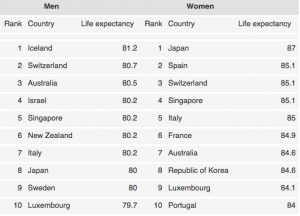Tag Archives: longevity
World-leading natural health expert Dr Brian Clement holds London workshop
Do you want to fight the effects of premature ageing? Don’t miss out on this top anti-ageing event being held later this month in London!
Join Dr Brian Clement, one of the world’s leading naturopathic doctors and nutritionists, for his one-off workshop at London’s Regents University on 21 June 2014. Find out his life changing tips on how to tackle premature ageing and disease, enhance longevity and maintain optimum health.
Known for his pioneering work as the director of the world renowned Hippocrates Health Institute in Florida and the author of more than 20 books, Dr Clement has been widely recognised for his contribution in the field of modern health care. His best-selling book ‘Living Foods for Optimum Health’ has been acclaimed as a ‘landmark guide to the essentials of living’.
During the workshop Dr Clement will enlighten you on which supplements are best for YOUR body and which ones can effect rejuvenation, delay premature ageing and support wellbeing. Come and learn the truth about health supplements, and discover how to distinguish between natural, effective supplements, and the toxic and chemical ones.
Find out about Dr Clement’s extensive clinical research and training in the field of disease and prevention and get the opportunity to ask him any questions on the subject.
You’ll also be given an insight into the Life Transformation Programme which has evolved over the last 60 years and which provides the ultimate approach to health, natural beauty and longevity.
Included in the day is a delicious Hippocrates inspired gourmet lunch box from Nama, London’s leading artisan raw food restaurant.
This event will book up fast so don’t delay and book your place today! Tickets are still available at the special price of £85.
During the workshop Dr Clement will talk about which supplements are best for your body and which ones can effect rejuvenation, delay premature ageing and support wellbeing.
Find out about Dr Clement’s extensive clinical research and training in the field of disease and prevention and get the opportunity to ask him any questions on the subject.
You’ll also be given an insight into the Life Transformation Programme which has evolved over the last 60 years and which provides the ultimate approach to health, natural beauty and longevity.
To book your ticket click here
Longevity increases worldwide
People everywhere are living longer, according to the “World Health Statistics 2014” published today by WHO. Based on global averages, a girl who was born in 2012 can expect to live to around 73 years, and a boy to the age of 68. This is six years longer than the average global life expectancy for a child born in 1990.
WHO’s annual statistics report shows that low-income countries have made the greatest progress, with an average increase in life expectancy by 9 years from 1990 to 2012. The top six countries where life expectancy increased the most were Liberia which saw a 20-year increase (from 42 years in 1990 to 62 years in 2012) followed by Ethiopia (from 45 to 64 years), Maldives (58 to 77 years), Cambodia (54 to 72 years), Timor-Leste (50 to 66 years) and Rwanda (48 to 65 years).
“An important reason why global life expectancy has improved so much is that fewer children are dying before their fifth birthday,” says Dr Margaret Chan, WHO Director-General. “But there is still a major rich-poor divide: people in high-income countries continue to have a much better chance of living longer than people in low-income countries.”
Gaps between rich and poor countries
A boy born in 2012 in a high-income country can expect to live to the age of around 76 – 16 years longer than a boy born in a low-income country (age 60). For girls, the difference is even wider; a gap of 19 years separates life expectancy in high-income (82 years) and low-income countries (63 years).
Wherever they live in the world, women live longer than men. The gap between male and female life expectancy is greater in high-income countries where women live around six years longer than men. In low-income countries, the difference is around three years. Women in Japan have the longest life expectancy in the world at 87 years, followed by Spain, Switzerland and Singapore. Female life expectancy in all the top 10 countries was 84 years or longer.
Life expectancy among men is 80 years or more in nine countries, with the longest male life expectancy in Iceland, Switzerland and Australia. “In high-income countries, much of the gain in life expectancy is due to success in tackling noncommunicable diseases,” says Dr Ties Boerma, Director of the Department of Health Statistics and Information Systems at WHO.
“Fewer men and women are dying before they get to their 60th birthday from heart disease and stroke. Richer countries have become better at monitoring and managing high blood pressure for example.” Declining tobacco use is also a key factor in helping people live longer in several countries.
At the other end of the scale, life expectancy for both men and women is still less than 55 years in nine sub-Saharan African countries – Angola, Central African Republic, Chad, Côte d’Ivoire, Democratic Republic of the Congo, Lesotho, Mozambique, Nigeria and Sierra Leone.
Life expectancy at birth among men and women in 2012 in the 10 top-ranked countries*
* Countries with a population below 250 000 are omitted due to uncertainty in life-expectancy estimates.
Some other key facts from “World Health Statistics 2014”
- The top three causes of years of life lost due to premature death are coronary heart disease, lower respiratory infections (such as pneumonia) and stroke.
- Worldwide, a major shift is occurring in the causes and ages of death. In 22 countries (all in Africa), 70% or more of years of life lost (due to premature deaths) are still caused by infectious diseases and related conditions. Meanwhile, in 47 countries (mostly high-income), noncommunicable diseases and injuries cause more than 90% of years of life lost. More than 100 countries are transitioning rapidly towards a greater proportion of deaths from noncommunicable diseases and injuries.
- Around 44 million (6.7%) of the world’s children aged less than five years were overweight or obese in 2012. Ten million of these children were in the WHO African Region where levels of child obesity have increased rapidly.
- Most deaths among under-fives occur among children born prematurely (17.3%); pneumonia is responsible for the second highest number of deaths (15.2%).
- Between 1995 and 2012, 56 million people were successfully treated for tuberculosis and 22 million lives were saved. In 2012, an estimated 450 000 people worldwide developed multi-drug resistant tuberculosis.
- Only one-third of all deaths worldwide are recorded in civil registries along with cause-of-death information.
Skipping breakfast – the new rules on fat loss and staying younger!
Positive lifestyle changes in older age adds years to lifespan
- Half of the participants survived longer than 90 years of age
- Not surprisingly, women and nonsmokers lived longer than men and current smokers
- Subjects who regularly engaged in physical activity lived a median of two years longer than those who did not
- Those who consumed alcohol lived a median of 1.3 years more than those who were never drinkers.
Men and women who had a low risk profile, characterised by healthy lifestyle behaviours; participation in one or more leisure activities and having a rich social network (defined as living with a spouse, being in regular contact with children, and having daily to weekly contact with relatives and friends) or a moderate social network (defined as having two of the three elements of a rich social network) lived a median of 5.4 years longer than those who had a high risk profile that included none of these factors.
Exercise boosts benefits of calorie restriction on longevity
Exercise boosts the benefits of calorie restriction which is turn kickstarts the human metabolism to extend lifespan.
![aerobicexercise [100x100].jpg](https://www.elixirnews.com/assets_c/2012/07/aerobicexercise%20%5B100x100%5D-thumb-100x99-651.jpg)
Jogging can add years to your life, says new study
 Copenhagen: Jogging for as little as an hour a week can put years on your life, new research has shown.
Copenhagen: Jogging for as little as an hour a week can put years on your life, new research has shown.
Regular running increases the average life expectancy of men and women by around six years, a study found.
The greatest benefit came from jogging at a “slow or average” pace – enough to cause slight breathlessness – rather than pushing to physical limits.
Danish heart expert Dr Peter Schnohr, who led the study of almost 2,000 male and female joggers, said: “The results of our research allow us to definitively answer the question of whether jogging is good for your health.
“We can say with certainty that regular jogging increases longevity. The good news is that you don’t actually need to do that much to reap the benefits.”
The jogging research is part of the Copenhagen City Heart Study which has been monitoring the health of 20,000 Danish men and women aged 20 to 93 since 1976.
A team led by Dr Schnohr looked at death rates among a sub-group of 1,116 male and 762 female joggers over a period of up to 35 years.
Participants were asked how much time they spent jogging each week, and whether they ran at a slow, average or fast pace.
Compared with non-joggers in the main heart study population, the risk of death for both male and female runners was reduced by 44%.
The data showed that, after taking account of age, jogging increased the lifespan of men by 6.2 years and of women by 5.6 years.
Further analysis of the association between jogging and death rate revealed a “U-shaped curve”.
This meant improvements were seen with increasing levels of exercise until an optimum point was reached, after which they reduced.
Between one hour and two-and-a-half hours of moderately paced jogging a week, undertaken over two to three sessions, was ideal, said the scientists.
“The relationship appears much like alcohol intakes,” said Dr Schnohr, who presented the findings today at a meeting of heart experts in Dublin. “Mortality is lower in people reporting moderate jogging than in non-joggers or those undertaking extreme levels of exercise.
“You should aim to feel a little breathless, but not very breathless.”
He said jogging delivered multiple health benefits, including raised oxygen uptake, increased insulin sensitivity, higher levels of “good” HDL cholesterol, lowered blood pressure, and reduced blood clotting.
Elixir of life drug found on Easter Island
New York: A drug has been discovered on one of the remotest places on earth andwhich scientists believe can reverse the effects of premature ageing and could extend human life by more than a decade.Researchers are looking at ways to market the drug. 
Rapamycin, which is being called the “forever young” drug, was created from a chemical found in the soil on Easter Island, 2,000 miles off the coast of Chile in the Pacific Ocean.
The drug is already used to supress the immune system, thereby assisting organ transplants. It was used in experiments on children suffering from Hutchinson-Gilford Progeria Syndrome (HGPS), a rare genetic condition in which ageing is hyper-accelerated and sufferers die at around 12 years.
HGPS causes a dangerous process whereby a protein called progerin builds up in every cell of the body, causing them to age prematurely, according to a report in the medical journalScience Translational Medicine.
Rapamycin cleaned the cells of progerin and left healthy cells.
Researchers in the US are expected to start looking at whether the drug could be used more widely, after similarities between HGPS and the normal ageing process were uncovered.
Dimitri Krainc, co-author of the study, said: “Even a small activation of this ‘debris removal’ system would extend the health and life-span of our cells and organs.”
One in four UK children will live to 100
London: More than a quarter of all children living in Britain today will become centenarians, according to new UK government statistics.
 This means that of the 4 million children now aged 16 and under, 3.3million (27 per cent) will celebrate their 100th birthday.Across all age groups there is a one in six change of reaching 100.
This means that of the 4 million children now aged 16 and under, 3.3million (27 per cent) will celebrate their 100th birthday.Across all age groups there is a one in six change of reaching 100.
A 16-year-old boy is expected to live until he is nearly 88, while a girl of the same age will reach 91. Around 900,000 future ‘centenarians’ are pensioners over 65.
Nearly 10 per cent of people over 65 will get to 100, rising to 12.3 per cent of people aged 51 to 65 and 18.5 per cent of people aged 17 to 50.
The figures are a worry for pension providers including the UK state pension. One proposal being considered is that the age will continue to go up whenever official life expectancy forecasts are increased.
It also raises anotehr issue of millions of people surviving until their 100th birthday with a dwindling income and poor health.
Shopping adds years to lifespan – new study
Washington: If you want to live longer you should spend more time shopping, ccording to a study that was recently published in the Journal of Epidemiology and Community Health.
 A low-impact physical activity like shopping improves heart health as well as balance and coordination in the elderly, says Kelly D. Horton, a research and policy specialist at the Centre for Healthy Aging in Washington DC. She told HealthDay:
A low-impact physical activity like shopping improves heart health as well as balance and coordination in the elderly, says Kelly D. Horton, a research and policy specialist at the Centre for Healthy Aging in Washington DC. She told HealthDay:
“Shopping provides an enjoyable activity and helps older adults feel included in their community. In addition to physical activity, frequent shopping among older adults has also been related to improved nutrition intake.”
And men seemed to benefit more than women, said the study, with the men who went shopping once a day being less likely to die by 28 percent. Compared to formal exercise, researchers said that shopping is an easy way for elderly people to get leisurely physical activity.
ASK YOUR ANTI-AGEING HEALTH & BEAUTY QUESTIONS HERE

Get answers from world-leading experts on anti-aging topics here – whether is about preventative healthcare, the latest rejuvenation treatments or the best spas and doctors…
Japanese longevity continues to grow

Tokyo: Japanese people are living longer than ever, with the average life expectancy now 86.05 years for women and 79.29 years for men, the country’s health ministry has revealed.
The life expectancy of Japanese women increased by almost 22 days in 2008 from the previous year, while men added another 37 days, the ministry said.
The longevity of the Japanese is attributed in part to a healthy traditional diet including fish and vegetables and an active lifestyle.
But longevity is causing economic problems for Japan, which has one of the world’s lowest birth rates, leaving a shrinking working population to support a mass of retirees.
Slightly obese who exercise live longer than skinnies

New York: Slightly overweight people live longer than those of a “healthy” weight, according to new research.
The researchers in the US and Canada concluded that a person’s weight was not the full picture in good health. It is better to be plumpish and exercise than to be slim and sedentary, the study found
For instance, a stressed-out, sedentary person of normal weight may be in worse shape than a plumpish individual who exercises and keeps stress levels under control.
The researchers tracked the health and habits of more than 11,000 Canadians for 12 years.
The men and women were divided into five categories based on their Body Mass Index, calculated by dividing their weight in kilograms by their height in metres squared.
Using pounds and ounces, the weight in pounds is multiplied by 703 and divided by the height in inches squared.
This means that a 5ft 10in man weighing 11st 2lb would have a BMI of 22.3, placing him within the ‘normal’ weight range.
A rating below 18.5 is regarded as underweight, above 25 is overweight and above 30 regarded as obese.
Those with a BMI of above 35 were classed as extremely obese.
During the period studied, the underweight were 70 per cent more likely to have died than those of normal weight, followed by the extremely obese. However, the obese lived roughly as long as those of normal weight.
Those classed as overweight, meaning they were carrying a stone or so too much for their height, were 17 per cent less likely to have died, the journal Obesity reports.
Researcher David Feeny, of Kaiser Permanente Northwest Centre for Health Research in Oregon, said: ‘It’s not surprising that extreme underweight and extreme obesity increase the risk of dying but it is surprising that carrying a little extra weight may give people a longevity advantage.’
Dr Feeny, who falls into the overweight category, said there could be several explanations for the result.
For instance, concern about the health of the overweight and obese may mean that problems such as high blood pressure and diabetes are more likely to be spotted and treated, improving health.
And those who start out slightly heavier will have more reserves to call on should they lose weight due to ill health as they get older.
Finally, a person’s lifestyle has to be factored in.
Pilates – how to be superfit age 50+
Though sometimes we may care not to admit it, we all know that regular exercise can help keep us fit and healthy.
But if you still haven’t joined the gym, started playing a sport or just haven’t had time to build more activity into your daily life, there’s good news. According to experts, it’s not too late to start getting active on a regular basis even if you’re pushing 50.
In a paper published in the British Medical Journal (i), researchers from Uppsala University in Sweden report how they quizzed more than 2,000 men aged 50 and over about their activity levels. What they discovered was those who upped their activity levels in their 50s enjoyed similar life-extending benefits as those who were already regular exercisers by the time they reached middle age.
In fact, those who went from being low to moderate exercisers when they were younger to regular exercisers between the age of 50 to 60 were more likely to live longer than those who were already doing high levels of activity at that age. The effect on lifespan, say the researchers, is the same as giving up smoking.
“Increased physical activity in middle age is eventually followed by a reduction in mortality to the same level as seen among men with constantly high physical activity,” the report concludes. “This reduction is comparable with that associated with smoking cessation.”
The survey defines ‘heavy’ activity as hard physical training, competitive sport, active recreational sports and heavy gardening for at least three hours a week. But if the mere thought of three hours’ heavy sports training leaves you feeling weak at the knees, another way to increase your activity levels whatever your age is to practise an exercise method such as Pilates.
Lengthening and strengthening
Developed by German-born Joseph Pilates, Pilates is an exercise system that originally attracted performance professionals such as actors, dancers and athletes. Today, however, it is practised by ordinary people in gyms, exercise studios, church halls and living rooms all over the world, thanks to the way it effectively lengthens and strengthens all the body’s muscle groups.
And since it aims to strengthen core stability as well as improve posture and flexibility, Pilates is ideal for older exercisers with back and joint problems not to mention those who are want to avoid them in later life too.
However, so that seasoned and inexperienced exercisers alike can find out exactly what happens in the body during the classic series of Pilates exercises, Paul Massey a UK-based Pilates instructor and physiotherapist has written The Anatomy of Pilates (Lotus Publishing, £14.99).
The Anatomy of Pilates, which contains 150 full-colour anatomical illustrations, is divided in to chapters on the principles of the Pilates Method, posture and movement assessment, and application of the Pilates Method with a chapter on the classic series of exercises.
Along with detailed anatomical illustrations, each exercise in the series includes the following:
Full description of how the exercise performed
Objectives of the exercise
Tips on what to concentrate on
How the breathing pattern works
Checkpoints
Pitfalls
Each exercise also comes with list of which muscles are involved for instance, Spine Stretch Forward, which is used to stretch the spine and back extensors, involves the lower abdominals, hamstrings, back extensors, psoas and hip flexors.
And if you don’t have a degree in anatomy, the illustrations show you exactly where each muscle is and how it moves during the exercise.
“If you’re practising Pilates and you want to know more about it and how it works to lengthen and strengthen your muscles, The Anatomy of Pilates is exactly what you need,” claims the author.
The Anatomy of Pilates, priced from £14.99 and available from www.amazon.co.uk Waterstones and Lotus Publishing – www.lotuspublishing.co.uk
About the author
Paul Massey is a leading physiotherapist in private practice as well as a Pilates instructor. Massey works closely with governing bodies of track and field, swimming, and hockey, both at home and internationally, and has attended numerous Olympic Games and World Championships. He received the BBC Sports Personality of the Year Team Award in 2000. He lectures worldwide on sports injuries and Pilates, and has written or co-written several books on the subject, including Sports Pilates: How to Prevent and Overcome Sports Injuries and The Pilates Prescription for Back Pain.
References:
(i) Liisa Byberg, Håkan Melhus, Rolf Gedeborg, Johan Sundström, Anders Ahlbom, Björn Zethelius, Lars G Berglund, Alicja Wolk, Karl Michaëlsson. “Total mortality after changes in leisure time physical activity in 50 year old men: 35 year follow-up of population based cohort.” BMJ 2009;338:b688, doi: 10.1136/bmj.b688
Positive people live longer

Boston: Children of parents who live to be 100 have been found to have distinct personality traits that seem to be inherited and contribute to healthy ageing and longevity.
Boston University School of Medicine researchers conducted a study of centenarians, finding that longevity runs in families. The children studied experienced delays in heart disease, diabetes, and hypertension. Personality traits associated with healthy aging included agreeableness, extroversion, and low levels of neuroticism.
Studies involving children of centenarians have shown that, compared to the norm, children whose parents live a long life have a 120 percent lower mortality. They live longer and experience healthy aging by avoiding typical age-related illnesses until much later in life.
The study authors say, “Interestingly, whereas men and women generally differ substantially in their personality characteristics, the male and female offspring (of centenarians) tended to be similar, which speaks to the importance of these traits, irrespective of gender, for health aging and longevity.
Thomas Perls, MD, MPH, director of the New England Centenarian Study, and senior study author says the reason children of centenarians live longer may be in the way they handle stress, contributing to longevity and healthy aging. . “For example, people who are lower in neuroticism are able to manage or regulate stressful situations more effectively than those with higher neuroticism levels. Similarly, high extraversion levels have been associated with establishing friendships and looking after yourself.”
Dr. Perls says studies are underway that may tell us why some people live longer than others do. Maybe the secret to healthy ageing is in our genes or perhaps living longer is as simple as maintaining an outgoing personality, not worrying, and remaining agreeable with whatever comes our way.
Smart people live longer

Edinburgh: People with higher intelligence test scores in childhood and early adulthood tend to live longer. This result has been found among every population that has been studied, says expert Ian Deary, Professor of Psychology, Centre for Cognitive Ageing and Cognitive Epidemiology, Department of Psychology, University of Edinburgh.
Indeed, the impact of intelligence on mortality rivals well-known risk factors for illness and death, such as high blood pressure, being overweight, high blood glucose, and high cholesterol. Its effect is almost as important as that of smoking.
Differences in human intelligence have environmental and genetic causes. An intelligence test score in early life is partly a record of what the environment has wrought on the brain and the rest of the body up to that time.
Babies who have lower birth weights, for example, are more prone to chronic illnesses later in life. They also have, on average, slightly lower intelligence. But tests of whether birth weight might explain some of the link between intelligence and mortality have found no connection.
Parents occupations are also related to their childs intelligence and later risk of illness: children from more privileged backgrounds tend to have higher intelligence and better health, and to live longer. However, there is no convincing evidence that parental background explains the link between higher intelligence and longer life.
Other researchers have viewed intelligence test scores as possibly more than just an indicator of an efficient brain. After all, the brain is just one organ of the body, so people whose brains work well in early life may also have other organs and systems that are more efficient than others.
But this system integrity idea is somewhat vague and difficult to test. The best we have done to date has been to examine whether peoples reaction speeds are related to intelligence and to mortality. They are.
Reaction-time tests involve little thinking, and merely ask people to respond as fast as they can to simple stimuli. People who react faster have, on average, higher intelligence scores and live longer.
A third potential explanation is that intelligence is about good decision-making. Every day, as we live our lives, we make decisions about our health: what, when, and how much to eat; how much exercise to take; how to look after ourselves if we have an illness; and so forth.
Therefore, the reason that intelligence and death are linked might be that people with higher intelligence in childhood make better decisions about health, and have healthier behaviours. As adults, they tend to have better diets, exercise more, gain less weight, have fewer hangovers, and so on.
So far, so good. But we do not yet have the full story. There have not been any studies with data on childhood intelligence, lots of subsequent data on adult health behaviours, and then a long-term follow-up for deaths. And only such a study could tell us whether it is these healthy behaviours that explain the link between intelligence and death.
A fourth type of explanation is that people with higher intelligence in childhood tend to attain better educational qualifications, work in more professional jobs, have higher incomes, and live in more affluent areas.
These variables are related to living longer, too. So, perhaps thats it: higher intelligence buys people into safer and more health-friendly environments.
Certainly, in some studies, social class in adulthood seems to explain a lot of the link between intelligence and death.
The problem is that this explanation is statistical. We are still not sure whether, say, education and occupation explain the effect of intelligence on health, or whether they are, in effect, merely surrogate measures of intelligence.
Researchers have also searched for clues about the intelligence-mortality link in specific types of death. This has been revealing. Lower intelligence in early life is associated with a greater likelihood of dying from, for example, cardiovascular disease, accidents, suicide, and homicide. The evidence for cancer is less certain. As we have come across these specific findings, we have realised that each link might need a different explanation.
Finally, we know that how intelligent we are and how long we shall live are caused by both environmental and genetic influences. There are experimental designs, using twins, that can find out the extent to which intelligence and mortality are linked because they share environmental and genetic influences.
Among the most informative exercises we can undertake in cognitive epidemiology is to obtain a large group of twins on whom there is data on early-life intelligence and who were tracked for a long time to find out who had died.
The ultimate aim of this research is to find out what intelligent people have and do that enables them to live longer. Once we know that, we will be able to share and apply that knowledge with the aim of achieving optimal health for all.
Non-smokers live longer

London: Smoking matters more than money and class in determining how long you will live, researchers said.
Smokers from the highest social class are more likely to die early than non-smokers in the lowest class. And smoking also wipes out the longevity advantage that woman normally have over men.
The findings came from a massive study involving more than 15,000 men and women in Paisley and Renfrew. Carried out over the course of 28 years, the findings are reported today in the online edition of the British Medical Journal.
The researchers found that a well-off professional who smokes has a far lower survival rate than a non-smoking low-paid worker of the same sex. Among both men and women, smokers of all social classes ran a much higher risk of dying early than non-smokers from the lowest social classes.
“In essence, neither affluence nor being female offers a defence against the toxicity of tobacco,” said the researchers, led by Dr Laurence Gruer, director of public health science with NHS Health Scotland.
The findings also suggest there is little scope for reducing class-related health inequalities unless smoking rates in the lower social classes can be reduced.
The study began with 8,353 women and 7,049 men aged 45-64 in the early 1970s. These were then divided into 24 groups – male or female, smokers, ex-smokers or never-smokers – and all categorised in one of four social class headings.
After 28 years, 56% of non-smoking women and 36% of non-smoking men in the bottom two social classes were still alive – compared with only 41% of women smokers in the top two classes and 24% of men.
The researchers also found that most deaths from lung cancer were among smokers. There were 842 deaths from lung cancer – 5% of them among those who had never smoked, 9% amongst former smokers, and 86% among current smokers.
The researchers also found that the death rate for ex-smokers was similar to those who had never smoked, suggesting that quitting can make a significant difference regardless of status.
Collagen anti-ageing turns back your skin clock

London: Imagine a pill that would tackle signs of ageing as well as kill joint pain, increase your agility, improve your stamina and help your overall fitness
Pure-Col is a 100% pure collagen formula in tablet form that does exactly this, providing the ideal solution for those seeking physiological protection, maintenance and repair from exercise and a skin boost that reduces the appearance of lines on the face. With extensive documented research and clinical trials by doctors and specialists across the world to prove the efficacy of collagen and its combined grooming and fitness benefits, Pure-Col is the ideal skin and performance boost!
So how does it work?
Collagen is the most abundant structural protein found in cartilage, muscle, tendons, ligaments and bones. It has, however, been scientifically shown that collagen diminishes at a rate of approximately 1.5% per annum from the age of 25 years onwards – which is why it is essential to supplement this reduction to ensure long-lasting smooth, firm and supple skin as well as optimum maintenance.
Following extensive documented research and clinical trials to prove its efficacy, Pure-Col is an ideal supplement for those suffering from sustained injury or experience joint pain due to its ability to protect cartilage and synovial fluid against deterioration. It is the raw material used for cartilage synthesis and repair and can also reduce oxidative damage to joints, thus stimulating significant reductions in joint pain, tenderness and swelling.
The benefits of Pure-Col include:
Smoothed lines and wrinkles
Smoother, tighter skin, thicker hair and strengthened nails
Increased stamina, agility, speed and performance
Reduces aches and pains
Overall physiological protection, maintenance and repair
Radiant complexion
Improves body’s joint mobility
100% natural with no known side-effects
So what is the difference between Pure-Col and other collagen supplements?
With over 20 years of research and development, Pure-Col goes through a special and complicated production process to ensure maximum absorption. Unlike other collagen supplements, which the body finds difficult to absorb effectively, this patented formula ensures that the objectives of optimum bioactivity and as close to 100% absorption by the body are achieved.
Pure-Col is priced £29.95 for one months supply. For stockist details or to order, please contact 100% Collagen Ltd on 0191 291 3385 or visit www.collagen4u.co.uk
Alzheimer’s drug helps patients live longer
London: A new study published in the The Lancet Neurology journal has revealed that the drug, Galantamine, improves the quality of life for sufferers of Alzheimer’s Disease.
The research showed that it improves the condition of patients and extends their life expectancy.
But in the UK, the £2.50 a day treatment, is not available to patients when symptoms become too severe.
Professor Alistair Burns of the University of Manchester, who led the study said: “The results from a very conservative viewpoint do not support withdrawal of such treatment.”
Numbers of “oldest old” set to double in 25 years – UK report
London: The ageing population in the UK is growing rapidly, according to new Government statistics.
Nearly one in four of the population will be over 65 in less than 25 years, and the number of those over 85 – the oldest old, would more than double.
The forecast from the Office for National Statistics says this will result more resources being directed towards the elderly including health and social care and transport.
Improvements in medical treatments and social conditiions mean that many more people are living longer and the younger generation will have to work longer and pay more in taxes.
The ONS said that the number of people expected to live more than 85 years would rise to more than three million by 2032. It added that the number of people with dementia could double to 1.4 million within 30 years.
By 2032 the 85-plus group will make up 4 per cent of the population. That means the proportion of people who use public services the most and who depend on family, neighbours and so on is increasing.
The report also said that increasing the retirement age was the key to supporting the millions of extra older people who will need assistance.
But increasingly men and women will face the dilemma of how to look after their elderly relatives when they themselves are reaching retirement.
Demand for long-term care is inevitably going to increase over the coming years as the population aged 85 and over grows.
The new figures show there were 9.5 million over 65s in 2007. By 2032 the figure is projected to increase to 16.1 million, 23 per cent of the estimated total population.
In 1982 there were 600,000 people over 85, or 1.1 per cent of the total population. By last year this had doubled to 1.3 million and will rise to 3.1 million by 2032.
In spite of the growing number of old people, the proportion of over 65s living in communal establishments fell between 1991 and 2001 as a result of government policies to support people in their own homes and communities.
The analysis also showed that men are living longer and closing the gap with women.
Norway’s oldest woman dies
Oslo: Norway’s oldest woman, Gunda Harangen, who had attributed her longevity to celibacy and her daily glass of cognac, has died at the age of 109.
Harangen, the eldest of seven children, was born on December 28, 1898.
In a 2006 interview on the secret of her longevity, she said she believed she had lived so long because she drank one glass of cognac every day and did not have a man in her life.
She passed away in her sleep on November 25, her nephew told the local Laagendalsposten daily in south-eastern Norway.
Scientists move closer to human immortality
Madrid: Scientists at the Spanish National Cancer Centre found evidence that a natural protein could be the key ingredient in an elixir of eternal youth.
According to the scientists, boosting the amount of the naturally forming substance, telomerase, in the body could prevent cells from dying and thereby slow the process of ageing.
Telomerase helps maintain the protective caps at ends of chromosomes which act like ends of shoelaces and stop them unravelling. As people age and the cells divide, these caps become frayed and shorter and are so damaged that the cell dies eventually.
So far the scientists have only carried out an experiment on laboratory rodents. They found that those mice genetically engineered to produce ten times the normal levels of telomerase lived 50 per cent longer than normal. Those animals also had less fat, had better co-ordination and were better at processing sugar.
Lead researcher Maria Blasco said that the enzyme was capable of turning “a normal, mortal cell into an immortal cell” and a similar approach could eventually lead to extended human lifespans.
“You can delay the ageing of mice and increase their lifespan. (But) I think it is very hard to extrapolate data from mouse ageing to human ageing,” she told the New Scientist magazine.
One of the problems with boosting telomerase is that it can increase the risk of cancer. However, she said that the obstacle could be overcome by issuing cancer drugs that could offset the negative affects.
Life expectancy in Britain falls
London: Britons have one of the lowest life expectancies in Europe, according to a new study published in the medical magazine, The Lancet.
Researchers at Leicester University discovered that a British woman who reached the age of 50 in 2005 can expect to live for another 32.7 years – reaching 82 years and eight months – ten months less than the European average.
This figure is lower than that for France and Germany, according to the league table of 25 European Union countries.
Britain came just 16th, just above the poorer nations of eastern Europe, and Denmark.
The figures also revealed that while British men’s relative position is slightly better than women’s, they still lag behind countries such as France.
A British man who reached 50 in 2005 – the most recent year for which figures are available – can expect another 29 and a half years of life.
This is about ten months above the European average, but a month lower than France and 11 months lower than Italy.
New pill can “jumpstart” youth hormone
New York: A new drug can boost levels of one of the most important “youth hormones” in older people, according to a new study by the University of Virginia.
Patients aged between 60 and 61, took doses of an experimental drug called MK-677, that prompts the body to release growth hormone, over a two-year period. This lead to them gaining lean fat-free muscle mass and a redistribution of “middle-age spread” to the arms and legs. There was also a decrease in insulin sensitivity.
Altogether the trial involved 65 healthy people, some of whom were given a placebo. Doctors found that patients who had received the therapy experienced an increase in growth hormone levels equivalent to levels seen among healthy young adults. The findings are reported in the Nov. 3 issue of the Annals of Internal Medicine.
This compared to those who didn’t get the growth-hormone boosting therapy losting about one pound of muscle in a year, wheras those who got the drug gained about two pounds of muscle mass
Growth hormone levels are highest during mid-puberty, but drop by about half by the time men and women turn 30. The decline continues , with levels diminishing at a rate of about 50 percent every 7 years.
Study author, Dr Michael Thorner said: “As we all get older, our body composition changes. So, people in their 80s and 90s all look the same: their fat is distributed in the center and the abdomen, and they lose a lot of muscle mass.”
“This has become an increasing problem as life expectancy has increased from 45 at the turn of the century to now over 80,” he continued. “Obviously people would like to remain independent and functional as long as possible, but these changes work against them.
“Because this age-related reduction in muscle mass is associated with a decrease in growth hormone secretion, the rationale for the therapy we’re studying is to try and address the problem by boosting the normal secretion of this hormone,” Thorner said.
Human growth hormone, produced naturally by the body’s pituitary gland, is essential to healthy development and the maintenance of tissues and organs. But as people enter their 30s and 40s, levels of the hormone start to decline.
Synthetic versions are legally prescribed for children with “dwarfism” and for adults with a abnormal deficiency – the decline brought about by ageing is not considered abnormal.
Nevertheless, a growing number of adults spend thousands of dollars on buying self-injectable human growth hormone which can be bought on the internet or prescribed by anti-ageing doctors.
Its use is controversial and has also become the focus of “sports doping” headlines, with well-known athletes allegedly turning to the drug for its reputed performance-enhancing properties.
According to the American College of Physicians, it’s estimated that some patients spend as much as $1,000 to $2,000 per month on the drug for anti-aging purposes.
Read more about muscles and ageing the US National Institute on Aging
More Britons live to 100
London: More Britons are living to their 100th birthday and beyond thanks to better nutrition, healthier lifestyles and improved drug treatments, government figures have revealed.
The latest report from the Office of National Statistics shows one in 15 people in their 80s now living in the UK will hit the age of 100, with many expected to live for longer.
In 2005 there was around 8,300 people aged 100 or older, but this figure jumped by almost a 1,000 to 9,300 Britons last year. There were only 100 centenarians in 1911, said the ONS.
The ONS said the number of centenarians is growing at around 5.4% a year. The main reasons we are living longer are due to better nutrition, improved housing and living standards and better drugs and medical treatment.
Pamela Holmes, head of healthy ageing at Help the Aged, told the Times, ‘By making healthy choices in mid-life, we can greatly improve our chance of living longer and better. Educating people in the importance of eating well, exercising and stopping smoking can make real improvements years down the line.’












